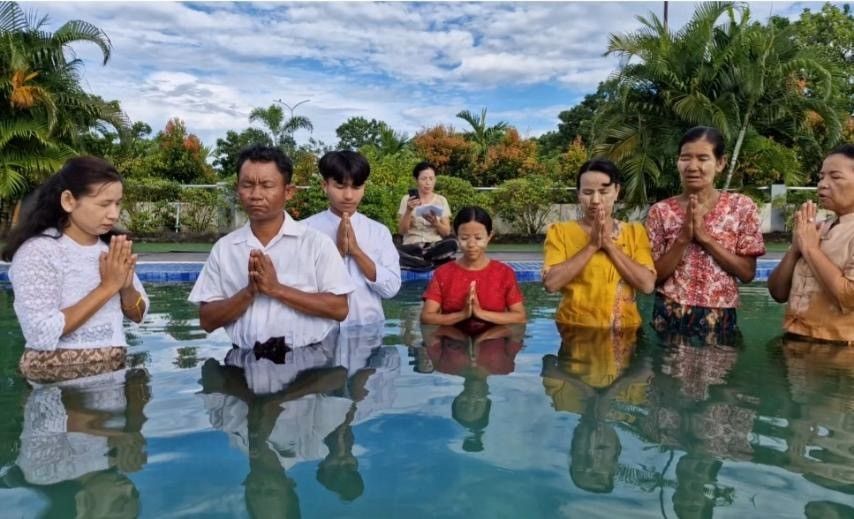William Christie
The 'Apostle to Tibet'
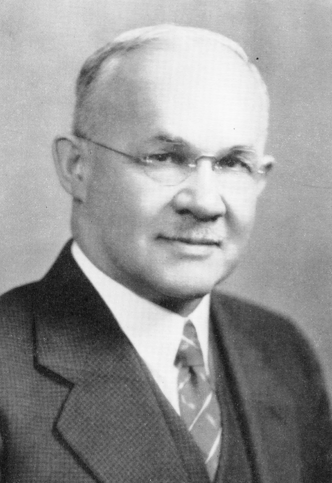
William Christie, dubbed the 'Apostle to Tibet'.
Of all the brave and faith-filled Evangelical missionaries to work among the Tibetan people, few were as fruitful for God's kingdom as the Scottish-born American William Christie, who served more than three decades in remote parts of the Amdo region in today's Gansu Province.
Christie's stellar career was mostly spent 'flying under the radar' of acclaim, as he served with what was then the little-known Christian and Missionary Alliance.[i] Despite Christie's relative obscurity, his reputation as a man of God, and his thorough knowledge of all things Tibetan, meant that other missionaries of his era didn't hesitate in referring to him as the 'Apostle to Tibet'.
Born in the small Scottish town of Turriff in 1870, Christie migrated to the United States when he was 19. Trained as a stonemason, he quickly gaining a reputation as a skilled worker in New York. However, the course of his life was dramatically altered in October 1891, when he attended a missionary convention at the Gospel Tabernacle. Many decades later, near the end of his life, Christie reflected on his call to service:
"I was impressed by the spiritual warmth there.... I was soon convinced of the need of complete surrender to Christ.... At the altar I made the surrender and sought for, and received, the Holy Spirit. The results were an increase in my love for the Word of God, delight in prayer, and witnessing to others for Christ.
At the October 1891 convention, I was present on Missionary Sunday. As the opening hymn was sung, I was suddenly thrilled from head to foot with a great emotion. Accompanying this came a deep desire to give my life for missionary work.... I prayed earnestly for the next two months for guidance as to what to do. As a result, I was led to give up my trade as a stone setter....
I was greatly moved by an appeal made by Dr. A. B. Simpson for volunteers for Tibet. After several days of prayer and thought, I told him of my desire to go to Tibet.... Looking back on the 58 years and more since then, I have every reason to believe that my call was of God."[ii]
Although he was just 21, Christie was already wealthy because of his lucrative profession. He kept his money and other items hidden in a box under his bed, but after accepting the call to God's service he turned his money over to the CMA treasurer, who applied it to his support on the field. Christie was able to live off the proceeds for years to come.
The CMA paired Christie together with William W. Simpson, who hailed from the hills of Tennessee. Before they sailed for the Orient in March 1892, Christie wrote: "By the grace of God I will spend and be spent for my Savior and the salvation of those who are sitting in awful darkness and sin and misery."[iii]
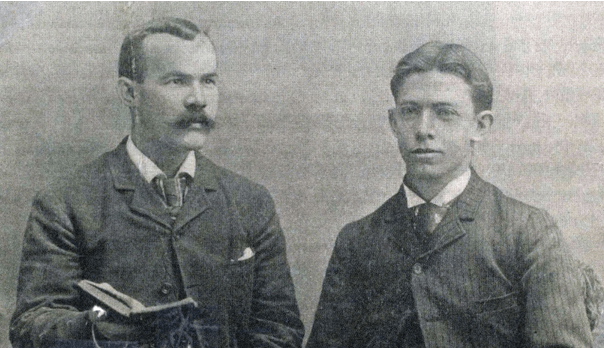
Young recruits William Christie (21) and William Simpson (22), prior to leaving for Tibet in 1892.
After their ship docked in Shanghai, the new recruits met up with Hudson Taylor, who warmly welcomed them. It was when the veteran statesman heard that Christie and Simpson had Tibet in their sights that he uttered his famous quote: "To make converts in Tibet is similar to going into a cave and trying to rob a lioness of her cubs."[iv]
After a long period of studying Chinese, Christie and Simpson were assigned to the northern Tibet border, in the Amdo region. Christie traveled extensively throughout the area, sowing the seed of God's Word among hundreds of the untouched Tibetan villages. This report from 1907 summarized one of his typical years: "I was away from home 166 days out of the year, and 69 full days of this number were spent in the saddle. I rode 1,700 miles [2,754 km] in the year."[v]
Stretched to the Limit
In such an isolated part of the world that was largely devoid of law and order, it was no surprise that trouble soon found William Christie. On one occasion, a prolonged drought had blighted the region. After consulting the gods and sorcerers, a group of Tibetan lamas announced that the drought was due to the presence of the Christians. A mob of bloodthirsty Tibetans suddenly stormed the gate of the mission at Baonan (now Jishishan). The other young missionaries were unable to speak either Chinese or Tibetan, but William Christie was a gifted linguist. In a calm manner consistent with how he treated all people,
"He immediately went to meet the men and inquired what they wanted. He soon learned that they represented the 12 Tibetan clans of the drought area who blamed the missionaries for their misfortune and had come to kill them.
The uproar of the mob made ordinary conversation impossible. But realizing their fanaticism and knowing their murderous intentions, literally with his back to the door of the house, Christie did his utmost to pacify and dissuade them. First he reasoned with the mob in the Tibetan tongue. In the same breath he ordered his servant in Mandarin to run to the Chinese fort for help. Without ceasing his Tibetan argument he shouted to the young missionaries in English, describing the danger, urging them to pray, and prepare to defend themselves if attacked.
Throughout this tri-lingual barrage, Christie searched the faces of the angry men. One seemed strangely familiar to him. Could he not have met that man somewhere? Suddenly it dawned on him. He recalled a nomad encampment on a windswept plateau. Out from a great black tent a Tibetan had come to welcome him. Weeks previously this same man had visited the mission house and Christie had entertained him for the night.... By the law of Tibetan hospitality your host for a night becomes your friend for life and must assist you in every time of need.
Knowing full well the power of the Tibetan code, Christie identified himself to his Tibetan host and claimed his help. He insisted that according to tribal custom, his friend should not only refuse to take part in the murderous attack, but also must do his utmost to prevent it.... This turned the tide. Even before the troops arrived, Christie had won and saved the missionaries' lives."[vi]
On another occasion, Christie and David Ekvall wanted to establish a mission in the key monastery town of Labrang, which at the time housed more than 4,000 monks. In preparation, the duo visited Labrang during one of the largest Buddhist festivals of the year. After they shared the gospel with many monks and pilgrims, a crowd of troublemakers agitated the people:
"Soon the threats gave way to flying clods of dirt and stones. One missionary broke his umbrella while trying to fend off missiles, and the other received a cut on his face. Suddenly two monastery guards charged into the mob with drawn swords and took the foreigners into protective custody.
The high lamas received the missionaries as objects of curiosity and gave them places of honor in the grandstand to watch the entire 'devil dance' that was to rid the community of evil influences for the coming year. When the dance concluded, the two white men were informed that they were part of the menace that the community wanted to be rid of."[vii]
Meanwhile, the owner of the inn where the missionaries had spent the night
"was beaten and driven out and his property was confiscated. The Gospels and tracts left by the missionaries were publicly burned. Worse still, an official proclamation was posted, warning that nobody should ever again house a preacher of the Jesus religion even for a night. Thus the door to Tibet, opened for so short a moment, was violently slammed shut....
They made two more short trips to Labrang. On the last, their Gospels were thrown back into their faces, the innkeeper who housed them was beaten, and the higher lamas ordered them to leave or be thrown into the river."[viii]
The lamas had made their intentions clear. They would not tolerate any rival religion in their domain. A further 25 years elapsed before the rulers of the Labrang Monastery allowed a missionary to live in the town.
A God-Ordained Union
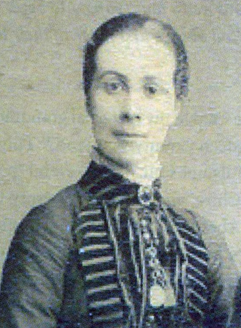
Jessie MacBeth
For seven long years William Christie had labored in remote Amdo as a single man, but God was preparing a young woman named Jessie MacBeth, who shared his call to pioneer missions. Years passed as she undertook medical training and joined the CMA, but finally the day arrived when the two met: Jessie visited the remote Tibetan mission station and encountered Christie for the first time. More than a century later, their grandson Bill Conrad remarked:
"One would love to know what the response from William Christie, himself single, must have been when he was first informed that a single female missionary from northern Scotland was...preparing to join the Gansu-Tibetan Border Mission of which he was field chairman!... Christie was assisting in the butchering of a sheep at the mission compound in Lintan on the day Jessie MacBeth arrived, and he was terribly embarrassed to be seen all blood-spattered by this 'bonnie Scottish lassie!'"[ix]
William and Jessie fell in love, but their wedding plans were delayed when the Boxer Rebellion broke out across China in the summer of 1900. They were finally married in Shanghai on June 17, 1901.
After finally reaching their new home on the Tibetan frontier, Jessie got to work, helping the sick and injured. Although Jessie knew that the medical needs of the local people would be great, she had not anticipated how highly treasured her skills would be among her fellow missionaries, many of whom were frequently ill in a region with no hospitals or doctors. It was said of Jessie:
"The God-sent nurse came like an angel from heaven.... With scanty medical supplies, inadequate equipment and limited technical knowledge, but with unbounded faith and unfailing courage, Mrs. Christie performed daring operations which, by the blessing of God, turned out to be life-saving miracles. Day after day her hands were immersed in strong antiseptic solutions, until her wedding ring crumbled from her finger."[ii]
A Precious Family
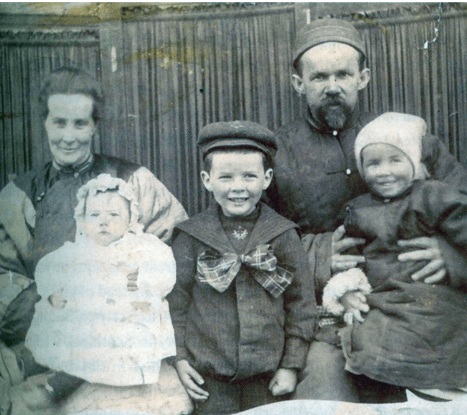
The Christie family in 1907, with sons Peter, Robert and William. [William C. Conrad]
Barely a year had elapsed since the wedding when Jessie gave birth to their first child, Robert. A second son, William, was born in December 1903. As if living in one of the wildest and most remote places on earth wasn't challenging enough, William was born with cerebral palsy. His nephew Bill Conrad later remarked:
"His body and speech were markedly affected for all of his 84 years, but his mind remained brilliant, and his commitment to God total until the very end of his life. Even his very severe physical handicap did not keep him from a life of godly service, as he served many years under the CMA as a missionary in the Philippine Islands."[xi]
One day, as the Christies passed through Lintan, an incident took place that was to have lasting effects for Christianity in the area down to the present day. As they traveled through the town, Jessie saw a small child lying in a pile of ash on the side of the road. The young girl, who was almost five-years-old,
"had been thrown away and left to die by her parents. Apparently, her family had encountered many instances of extreme difficulty, and their 'religious advisor' had told them that the family problems were because of demon possession in this young child. The family had been advised that needles were to be driven into her eyes to 'drive the demons out!' When this action did not solve the bad circumstances, they were told they must get rid of her....
Jessie brought the girl home, where she was able to nurse her back to health. One eye had been destroyed completely by the needle and subsequently had to be removed. The other eye, fortunately, retained useful (though diminished) vision for the remainder of her life. This little girl was named Gao Man Ying. She was formally adopted by the Christies so that her family would have no further claim upon her. Subsequently, Man Ying became a fine Christian."[xii]
A third son, Peter, was born at Choni in 1906. He later contracted the polio virus during a visit to America, causing both of his legs to be totally paralyzed.
When Jessie experienced complications during her fourth pregnancy, the pressure on the Christies reached breaking point. William three times submitted resignation letters to the CMA headquarters, but the leaders refused to accept them, and the Christies continued in their isolated service for God. Their only daughter, Hazel, was born without further problems.
The entire Christie family went on a much-needed furlough to the United States in 1908, and stopped in Scotland on the return journey to China, affording William and Jessie the opportunity to meet each other's family. As they headed back to their base after weeks of arduous travel, the most difficult part of the journey occurred. The Christies' grandson, Bill Conrad, described the vivid scene:
"Imagine the picture of father William carrying six-year-old William (cerebral palsied), Jessie carrying three-year-old Peter (recently paralyzed from polio), seven-year-old Robert carrying new-born Hazel, and hired porters at each stop along the way carrying the needed baggage for a seven-year term of missionary service!"[xiii]
Despite their overwhelming hardships and extreme challenges, God had the Christie family on the edge of the Tibetan world just as He wanted them—weak, and of little reputation in society; a family whose members needed to rely on Jesus for their daily needs. It was clear to everyone that any good fruit resulting from their service would be a work of God's grace, not the result of human effort.
Breakthrough at Choni
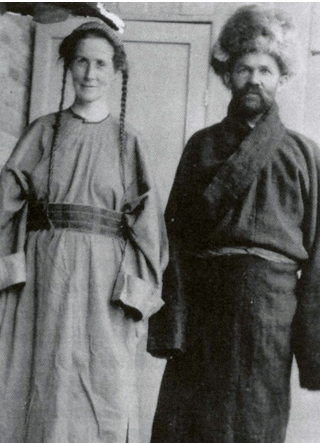
Jessie and William Christie at Choni.
An opportunity had opened in the monastery town of Choni, about 40 miles (65 km) southeast of Labrang. For almost a thousand years Choni had been ruled by a succession of Tibetan kings and princes, and the Christies lost no time in making the acquaintance of the prince, who ruled over 48 districts. The prince, however, was vehemently opposed to having foreigners live in his realm.
In the end, there was just one residence in Choni available to the Christie family—a house that was widely believed to be haunted after a murder had occurred in it. The townspeople stayed clear of the property, and it appears the prince may have allowed the missionaries to live there only because the locals believed a terrible catastrophe would befall anyone who resided in that house. The Christies were unconcerned, and bought the property for a very cheap price. After moving in they discovered a human skeleton, and realized that a murder had indeed taken place there.
After praying against any demonic influence, William and Jessie committed their family to the Lord Jesus, and to the amazement of the locals, they appeared happy and healthy as they established their home and ministry. The house served as the Christies' base for many years, proving a great launching pad as they shared the gospel with Tibetans throughout the area.
Decades later, William Christie summarized their activities at Choni:
"Christ and His salvation were proclaimed to prince, priests and people. In the town and monastery, as well as in the surrounding villages, the gospel reached all classes. A number accepted Christ, many being won by personal dealings in the guest room, and baptisms were held publicly in the Tao River. Full Tibetans, half Tibetans and Chinese were immersed before great crowds. A church was organized and regular services were held....
Excellent work was done among the children of the town, and even those of the prince's family attended the Sunday school. Mrs. Christie conducted a school with the equivalent of eight grades, and added a knitting class for girls.... Many of the girls were converted and married pastors, evangelists and other Christians. They are mothers and grandmothers in today's churches.
Promising boys were sent to the boarding school at Lintao. Upon graduation they entered the Bible Training School to become pastors and evangelists. One was called as pastor of the Choni church, which developed into a self-supporting congregation with an effective witness for Christ throughout the town and surrounding area.... And such was the power of the gospel in the one-time citadel of Satan."[xiv]
The years went by, and in 1922 Christie wrote about the potential for the gospel to spread more widely among other Tibetan groups from their strong base in Choni. He appealed for new workers with these heart-felt words:
"Our Tibetan field in western Gansu is immense and we have hardly touched the fringes. The Prince of Choni alone governs 48 clans and we can easily travel among these clans, as the prince is friendly and would protect us. In other parts where his jurisdiction does not reach, it is difficult to secure adequate protection.... If we had the workers to employ, we would press toward the west from the line we are now occupying.... I think we could easily employ one dozen foreign missionaries in places that are now accessible to us....
In sending out missionaries for work among the Tibetans, candidates with a strong constitution should be chosen, as work in Tibet is more strenuous than in most places. Missionaries that are afraid to expose themselves to hardship and even danger should not be sent."[xv]
The prince, who had originally allowed the Christies to reside in his kingdom, later appeared to regret his decision, especially when he discovered that his own family members were opening their hearts to the gospel. Not long after the prince started persecuting the fledgling church, judgment befell him. Christie recalled:
"The Choni prince, a secret foe of the gospel, resorted to threats and intimidation to prevent his people from becoming Christians, and was often unjust and cruel. But his sins overtook him, for his own people finally assassinated him, dragged his corpse out of the town and covered it with a heap of stones. In contrast the Church of Christ lives on, a memorial to the spiritual unity which is possible between two different races within the fellowship of the gospel."[xvi]
Another missionary, M. G. Griebenow, remembered the Choni ruler this way:
"The prince had been friendly and kind to the missionaries, a fact we greatly appreciated, but he never became a Christian, even though the Christies and the Hansens made every effort to win him to the Lord. He continued to live in sin and to be extremely cruel to his subjects. He had hundreds of men shot or beheaded and their heads displayed in public places. Finally his own officers, fearing for their own lives and the lives of their families, brutally murdered him but spared his wives and children."[xvii]
Almost a century has passed since William and Jessie Christie first moved into their haunted house and established the kingdom of God among the Choni Tibetans, and the Church of Jesus Christ has lived on. In 1997, a church building was constructed for Choni Tibetan believers in nearby Lintan, where one church member reportedly "sold her hair, and another family sold their TV to help build the new church."[xviii]
Today it is estimated that between 300 and 400 Choni Tibetans continue to trust in the Living God, with an even higher number of Han Chinese believers living in the town and surrounding districts. More Tibetans have probably been won to Christ at Choni than at any other Evangelical base in the Tibetan world.
Christie Buys a Monastery
In 1907, William Christie was presented with a remarkable opportunity that he couldn't ignore. In an act that many Tibetan Buddhists today would find repugnant, the missionary was able to purchase a small Buddhist monastery in the village of Luba, just 5 miles from Lintan.
The Christies had struck up a good relationship with the elderly lama in charge of the Luba Monastery. Deep into the night the lama had often sat up asking questions of Christie and the other missionaries, although he never bowed his knee to become a disciple of Christ.
The lama traveled all the way to Mongolia, hoping to attract donations for the upkeep of the monastery, but after a long absence it was discovered that he had died during the journey. The local landowners, not wanting to maintain the buildings themselves, asked Christie if he was interested in buying the monastery and surrounding land for a fraction of its actual value. The agreed price for the monastery was just $1,000 (worth about $27,000 today).
After much prayer, the board of the CMA in New York allowed Christie to proceed with the purchase, and "the buildings, fields, forests and grazing lands of the Luba Monastery became the property of the Christian and Missionary Alliance. Thus the Buddhist monastery became a gospel mission station."[xix]
A period of extensive cleaning and alterations ensued, transforming the idolatrous property into one suitable for Christian work. When it was ready, the CMA missionaries celebrated the purchase by holding their annual mission conference at Luba. Robert Ekvall reported on the memorable meeting:
"Blessing came to the local Tibetan and half-Tibetan community. The sick were healed, demons were cast out, and Tibetan homes were cleaned of every vestige of idolatry. Salvation flowed into the village of Luba. Idols were burned, idol scrolls were destroyed, and the rubbish of charms and shrines was tossed into the Tao River, carrying away the wreckage and becoming the waters of baptism for those who publicly confessed their Lord."[xx]
Man Ying, the little girl rescued by the Christies from the side of the road, became one of the precious living stones of the Luba church. Many years later, almost a quarter of a century after William Christie had retired from the mission field, he tenderly reminisced about the great things God had accomplished in Luba:
"The work at this center has been much blessed of God. A national pastor continues to serve the congregation and witness for Christ in all the surrounding territory. Here the Lord has manifested His grace and power in healing the sick and casting out demons. How pleasing to God it must be to receive the worship of these sincere souls from the different races—Chinese, Tibetan, and half-Tibetan. The former Buddhist monastery was truly transformed. Now it possessed a Christian church, an evangelistic commission and spiritual power. Little Luba has become the springboard for missionary advance into Tibet."[xxi]
In 1987, the Christies' grandson Bill Conrad visited Luba, hoping to find out what had happened to his adopted aunt (the little girl the Christies had found lying in a heap of ashes). Conrad was shocked by what he found. He wrote: "We met my two adoptive cousins living in Luba along with 30 members of their extended family on that trip. There was still an active church in Luba in 1987, and the family of those two adoptive cousins of mine were a large part of it. All 30 of them were Christians!"ixxii]
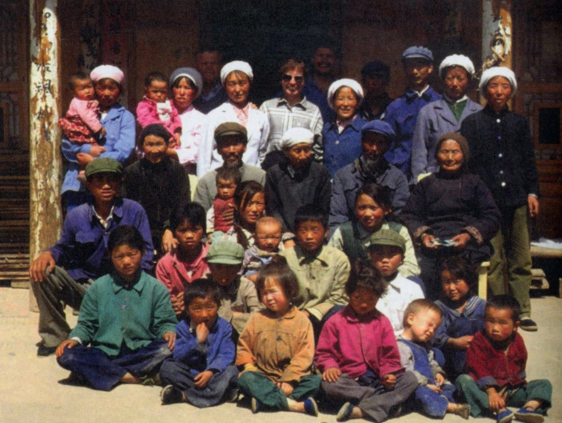
Believers at Luba in 1987. [William C. Conrad]
During Conrad's brief trip to Luba, three Public Security officers were alerted to the American's visit and immediately rode out on motorcycles to investigate. Conrad was in discussion with his newfound relatives when the officers arrived, and he expressed concern for their safety. They responded: "Don't worry about us! We don't fear them! But we worry about you Christians in America. We have heard that you have grown soft in your faith because you have never been made to go through persecution!"[xxiii]
Power Encounters
William Christie was not a Pentecostal missionary, but he trusted the God of the Bible, and he saw that the pages of God's Word were bursting with accounts of the miraculous. In order to meet the deepest needs of the people he was called to reach, Christie realized he needed to pray against the demonic strongholds that held Tibetan men and women captive; otherwise his witness would be of little effect.
On one occasion he was summoned to a village near Choni, where a Tibetan woman was out of control. As he entered the room, "the woman shrank into a corner and screamed, 'Oh! That man in white beside you! Take him away! Take him away!' This she repeated again and again, until quieted by Christie's prayer and command for the evil spirit to leave. No human being in white was present. Christie himself was dressed in blue."[xxiv]
Another time, Christie was talking with a demonized Tibetan man when the spirit unexpectedly spoke, with a diabolical guttural sound coming from the man's mouth. Christie, who was a conservative Scottish Christian, testified that the demon refused to leave the man, protesting: "If my more powerful friends were here they would help me resist you." Christie asked where the more powerful demons had gone, and was told they were in Europe helping white men kill one another. The Apostle to Tibet noted:
"This was astounding, for the First World War had just begun, but it was weeks before the Chinese officials or the missionaries on the Tibetan border knew that hostilities had commenced. There was no way by which that ignorant Tibetan villager could have known about Europe, let alone the war, except by spirit intelligence."[xxv]
Many incidents of demonic deliverance caused the gospel to advance, as stunned eyewitnesses told others what they had seen and heard. Tibetans were well aware of the power of the lamas and sorcerers to place curses on people, but nobody had ever heard of a power that could set demonized people free. As a result, the Name of Jesus Christ became greatly revered throughout parts of Amdo.
The Christies continued to serve God wholeheartedly as they raised their four children in Amdo, even though numerous attacks and threats were made on their lives. On one occasion, a band of 170 Tibetans from the wild Tebbu tribe came down from the hills to murder Christie and destroy the mission. The Tebbu sorcerers had gone into a trance to consult their powerful spirits. Unsurprisingly, the demons instructed the lawless men to kill the Christians, but another miraculous intervention spared the family.
In 1918, during their third furlough, the Christies made the heart-wrenching decision to leave their four children with friends in Montana so they could further their education, while William and Jessie returned to Tibet alone for another term of seven years. After boarding their ship to the Orient, the couple sat down and openly wept for some time. Their call had cost them everything they had, but with tears in their eyes they rededicated themselves to the Lord Jesus and His service.
Jessie returned to the USA to be with her four children in 1920, while William soldiered on alone in Tibet. When he finally left the area for the final time in 1924, many believers wept bitterly as the 'Apostle to Tibet' rode off after nearly 33 years of sterling missionary service in one of the most difficult places on earth.
After being reunited with his family in the United States, Christie continued to serve with the CMA, and for the next 20 years he preached nearly every weekend. He finally retired at the age of 77, and went to his eternal reward in January 1955, at the age of 84.
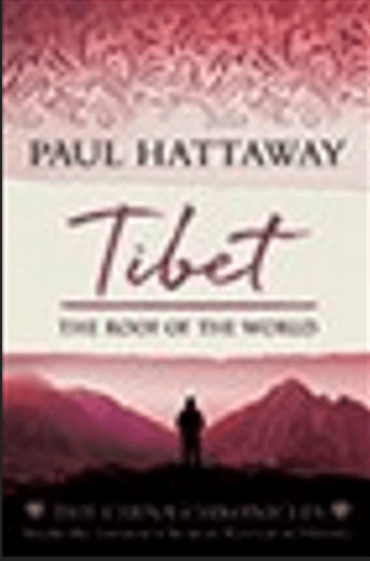
© This article is an extract from Paul Hattaway's book ‘Tibet: The Roof of the World’. You can order this or any of The China Chronicles books and e-books from our online bookstore
[iv] Carlsen, Tibet: In Search of a Miracle, p. 37.
[v] Cited in Conrad, Sent to Open Eyes, p. 19.
[vi] Van Dyck, William Christie, pp. 17-18.
[vii] Carlsen, Tibet: In Search of a Miracle, pp. 39-40.
[viii] Van Dyck, William Christie, pp. 47-48.
[ix] Conrad, Sent to Open Eyes, p. 13; partially quoting Van Dyck, William Christie, p. 50.
[x] Van Dyck, William Christie, pp. 54, 57.
[xi] Conrad, Sent to Open Eyes, p. 16.
[xii] Conrad, Sent to Open Eyes, p. 17.
[xiii] Conrad, Sent to Open Eyes, p. 20.
[xiv] Van Dyck, William Christie, pp. 66-68.
[xv] Stauffer, The Christian Occupation of China, p. 281.
[xvi] Van Dyck, William Christie, p. 67.
[xviii] Global Chinese Ministries (March 1998).
[xix] Van Dyck, William Christie, p. 73.
[xx] Van Dyck, William Christie, pp. 75-76.
[xxi] Van Dyck, William Christie, p. 77.
[xxii] Bill Conrad, personal communication, December 2017.
[xxiii] Conrad, Sent to Open Eyes, p. 80.




